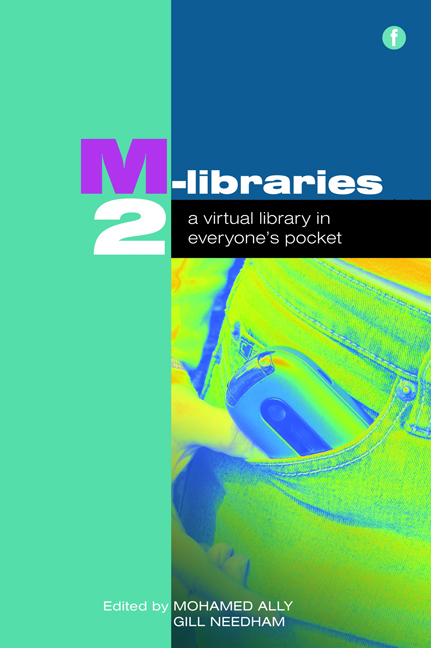Book contents
- Frontmatter
- Contents
- Acknowledgements
- Contributors
- Foreword
- Introduction
- PART 1 M-LIBRARIES: DEVELOPMENTS AROUND THE WORLD
- 1 Where books are few: the role of mobile phones in the developing world
- 2 Mobile technology in Indian libraries
- 3 Mobile technologies and their possibilities for the library, University of the South Pacific (USP)
- 4 M-library in an m-university: changing models in the Open University of Catalonia
- 5 Piloting mobile services at University of Houston Libraries
- PART 2 TECHNOLOGY IN M-LIBRARIES
- PART 3 APPLICATION OF M-LIBRARIES
- PART 4 M-LIBRARIES AND LEARNING
- PART 5 BUILDING THE EVIDENCE BASE FOR M-LIBRARIES
- Conclusion
- Index
1 - Where books are few: the role of mobile phones in the developing world
from PART 1 - M-LIBRARIES: DEVELOPMENTS AROUND THE WORLD
Published online by Cambridge University Press: 08 June 2018
- Frontmatter
- Contents
- Acknowledgements
- Contributors
- Foreword
- Introduction
- PART 1 M-LIBRARIES: DEVELOPMENTS AROUND THE WORLD
- 1 Where books are few: the role of mobile phones in the developing world
- 2 Mobile technology in Indian libraries
- 3 Mobile technologies and their possibilities for the library, University of the South Pacific (USP)
- 4 M-library in an m-university: changing models in the Open University of Catalonia
- 5 Piloting mobile services at University of Houston Libraries
- PART 2 TECHNOLOGY IN M-LIBRARIES
- PART 3 APPLICATION OF M-LIBRARIES
- PART 4 M-LIBRARIES AND LEARNING
- PART 5 BUILDING THE EVIDENCE BASE FOR M-LIBRARIES
- Conclusion
- Index
Summary
Introduction – ultra-mobility and digital youth
For every personal computer in a developing country there are roughly four mobile phones. Although many of these are likely to be older or low-end models, today's high-end devices have the equivalent processing power of a personal computer from the mid-1990s. In comparison, personal computers in 2009 have more number-crunching ability than all the computers that took the Apollo rocket to the moon over 30 years earlier in 1969. The boundary between mobile phones, hand-held game consoles, entertainment devices and personal computers is becoming increasingly blurred, with devices such as the Blackberry, Symbian-driven smart phones, GPS-enabled mobile phones, Ultra Mobile PCs and Nokia's N-Gage breaking new ground. Technology continues to advance at a remarkable pace, opening up new opportunities few people would have considered a few years ago.
Mobility – and increasingly ‘ultra mobility’ – is the buzzword of the day. According to the chief executive of OQO, a manufacturer of ultramobile PCs, ‘Ultra mobility is the ability to access all of your information, get in touch with anyone you want to, collaborate with anyone, and run any application you want from anywhere on the planet.’ Convergence is making this possible, with music players, Wi-Fi connectivity, video cameras, GPS units and live television capable of running on a single device, often a mobile phone. The days of carrying a separate phone, camera and music player are over. Indeed, many people are beginning to question use of the word phone at all, preferring to refer to these new gadgets as mobile communication devices, or digital assistants.
‘M-learning’ is a term regularly used to describe the many possibilities opened up by this convergence, whether they be getting exam results by mobile phone, lecture podcasting via iPod or structured language games on a Nintendo. These are still early days, and while examples of mlearning in action are continually on the rise, the benefits have already begun to be studied and documented. In Mobile Technologies and Learning: a technology update and m-learning project summary, Jill Attewell (Attewell, 2005) highlights several.
- Type
- Chapter
- Information
- M-Libraries 2A virtual library in everyone's pocket, pp. 3 - 12Publisher: FacetPrint publication year: 2010



